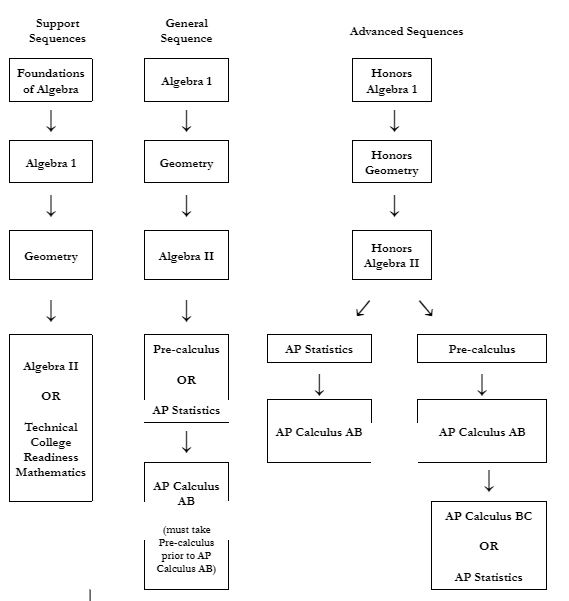"My favorite part of teaching math is teaching students complicated concepts, getting past the wall of not understanding. I just really enjoy teaching.”
Mathematics

Brett McLemore

Amanda Urquhart
"Mathematics is beautiful and honest. There is an art to the interconnectedness of mathematical concepts from wildly differing areas. "
Mathematics Department Staff:
Gloria Beard, Kelly Beavers, Thomas Borders, Javier Clark, Sherri Constable, Kelly Fresh, Glenn Hudson, Cathy McDaniel, Kristin McElroy, Brett McLemore, Jessica Rentz, Kim Roberts, Amanda Urquhart, Chris Wilson

Gloria Beard
"Math parallels life in terms of problem solving; it’s a puzzle beckoning to be solved.”

Kim Roberts
"Mathematics allows students to become problem solvers and critical thinkers, which will benefit them far beyond the classroom."
Georgia Standards of Excellence for Mathematics

Foundations of Algebra
Foundations of Algebra is a first year high school mathematics course option for students who have completed mathematics in grades 6 – 8 yet will need substantial support to bolster success in high school mathematics. The course is aimed at students who have reported low standardized test performance in prior grades and/or have demonstrated significant difficulties in previous mathematics classes. Foundations of Algebra will provide many opportunities to revisit and expand the understanding of foundational algebra concepts, will employ diagnostic means to offer focused interventions, and will incorporate varied instructional strategies to prepare students for required high school mathematics courses. The course will emphasize both algebra and numeracy in a variety of contexts including number sense, proportional reasoning, quantitative reasoning with functions, and solving equations and inequalities. Instruction and assessment should include the appropriate use of manipulatives and technology. Mathematics concepts should be represented in multiple ways, such as concrete/pictorial, verbal/written, numeric/data-based, graphical, and symbolic.
Algebra I
Algebra I is the first course in a sequence of three required high school courses designed to ensure career and college readiness. The course represents a discrete study of algebra with correlated statistics applications. The standards in the three-course high school sequence specify the mathematics that all students should study in order to be college and career ready. Additional mathematics content is provided in fourth credit courses and advanced courses including pre-calculus, calculus, advanced statistics, discrete mathematics, and mathematics of finance courses. High school course content standards are listed by conceptual categories including Number and Quantity, Algebra, Functions, Geometry, and Statistics and Probability. Conceptual categories portray a coherent view of high school mathematics content; a student’s work with functions, for example, crosses a number of traditional course boundaries, potentially up through and including Calculus. Standards for Mathematical Practice provide the foundation for instruction and assessment.
Honors Algebra I
Honors Algebra I is the first in a sequence of mathematics courses designed to ensure that students are prepared to take higher-level mathematics courses during their high school career. The course represents a discrete study of Algebra with correlated statistics applications. The Honors Algebra I course is designed to provide students with an in-depth level of instruction, an accelerated pace and a cooperative learning environment. The course guides students in the development of critical thinking skills and algebraic problem solving skills which provide the foundation for real world problem-solving. It is targeted to highly motivated students. This course prepares students for success in Honors Geometry and Honors Algebra II.
Geometry
Geometry is the second course in a sequence of three required high school courses designed to ensure career and college readiness. The course represents a discrete study of geometry with correlated statistics applications. The standards in the three-course high school sequence specify the mathematics that all students should study in order to be college and career ready. Additional mathematics content is provided in fourth credit courses and advanced courses including pre-calculus, calculus, advanced statistics, discrete mathematics, and mathematics of finance courses. High school course content standards are listed by conceptual categories including Number and Quantity, Algebra, Functions, Geometry, and Statistics and Probability. Conceptual categories portray a coherent view of high school mathematics content; a student’s work with functions, for example, crosses a number of traditional course boundaries, potentially up through and including calculus
Honors Geometry
Honors Geometry is the second in a sequence of mathematics courses designed to ensure that students are prepared to take higher-level mathematics courses during their high school career. The course represents a discrete study of geometry with correlated statistics applications. The Honors Geometry course is designed to provide students with an in-depth level of instruction, an accelerated pace and a cooperative learning environment. It is targeted to highly motivated students who have successfully completed Honors Algebra I. This course prepares students for success in Honors Algebra II.
Algebra II
Algebra II is the culminating course in a sequence of three high school courses designed to ensure career and college readiness. It is designed to prepare students for fourth course options relevant to their career pursuits. The standards in the three-course high school sequence specify the mathematics that all students should study in order to be college and career ready. Additional mathematics content is provided in fourth credit courses and advanced courses including pre-calculus, calculus, advanced statistics, discrete mathematics, and mathematics of finance courses. High school course content standards are listed by conceptual categories including Number and Quantity, Algebra, Functions, Geometry, and Statistics and Probability. Conceptual categories portray a coherent view of high school mathematics content; a student’s work with functions, for example, crosses a number of traditional course boundaries, potentially up through and including calculus. Standards for Mathematical Practice provide the foundation for instruction and assessment
Honors Algebra II
Honors Algebra II is the third in a sequence of mathematics courses designed to ensure that students are prepared to take higher‐level mathematics courses during their high school career. The course represents a discrete study of advanced algebra with correlated statistics applications. The Honors Algebra II course is designed to provide students with an in-depth level of instruction, an accelerated pace and a cooperative learning environment. The course guides students in the development of critical thinking skills and algebraic problem solving skills which provide the foundation for real world problem-solving. It is targeted to highly motivated students. This course prepares students for success in Accelerated Pre-Calculus
Accelerated Pre-Calculus
Accelerated Pre-Calculus focuses on standards to prepare students for a more intense study of mathematics. The critical areas organized in seven units delve deeper into content from previous courses. The study of circles and parabolas is extended to include other conics such as ellipses and hyperbolas. Trigonometric functions are further developed to include inverses, general triangles and identities. Matrices provide an organizational structure in which to represent and solve complex problems. Students expand the concepts of complex numbers and the coordinate plane to represent and operate upon vectors. Probability rounds out the course using counting methods, including their use in making and evaluating decisions. The Mathematical Practice Standards apply throughout each course and, together with the content standards, prescribe that students experience mathematics as a coherent, useful, and logical subject that makes use of their ability to make sense of problem situations. The Accelerated Pre-Calculus course is designed to provide students with an in-depth level of instruction, an accelerated pace and a cooperative learning environment. It is targeted to highly motivated students. This course prepares students for success in AP Calculus and AP Statistics.
Pre-Calculus
Pre-Calculus focuses on standards to prepare students for a more intense study of mathematics. The critical areas organized in seven units delve deeper into content from previous courses. The study of circles and parabolas is extended to include other conics such as ellipses and hyperbolas. Trigonometric functions are further developed to include inverses, general triangles and identities. Matrices provide an organizational structure in which to represent and solve complex problems. Students expand the concepts of complex numbers and the coordinate plane to represent and operate upon vectors. Probability rounds out the course using counting methods, including their use in making and evaluating decisions. The Mathematical Practice Standards apply throughout each course and, together with the content standards, prescribe that students experience mathematics as a coherent, useful, and logical subject that makes use of their ability to make sense of problem situations.
Advanced Mathematical Decision Making
This is a course designed to follow the completion of Advanced Algebra with support or Algebra II support. The course will give students further experience with statistical information and summaries, methods of designing and conducting statistical studies, an opportunity to analyze various voting processes, modeling of data, basic financial decisions, and use network models for making informed decisions.
Mathematics of Industry and Government
This is a course designed to follow the completion of Advanced Algebra, Algebra II, or Mathematics III OR Accelerated Analytic Geometry B/Advanced Algebra, Accelerated Geometry B/Algebra II, or Accelerated Mathematics II. Modeled after operations research courses, Mathematics of Industry and Government allows students to explore decision making in a variety of industries such as: Airline - scheduling planes and crews, pricing tickets, taking reservations, and planning the size of the fleet; Pharmaceutical - R& D management; Logistics companies - routing and planning; Lumber and wood products - managing forests and cutting timber; Local government - deployment of emergency services, and Policy studies and regulation - environmental pollution, air traffic safety, AIDS, and criminal justice policy. Students learn to focus on the development of mathematical models that can be used to model, improve, predict, and optimize real-world systems. These mathematical models include both deterministic models such as mathematical programming, routing or network flows and probabilistic models such as queuing, and simulation.
Technical College Readiness Mathematics
This course is designed to meet the needs of students who have passed Algebra I/Coordinate Algebra and Geometry/Analytic Geometry. This course is aimed at students who have experienced difficulty in passing middle school mathematics EOG assessments and have struggled significantly in high school math courses. Only students who score a 34 or lower on the ACCUPLACER Placement Assessment will be considered for placement in this course. This course will provide an opportunity for students to review mathematical skills needed for success in a technical college. This course does not meet the rigor requirements of a university/college course.
Advanced Placement Calculus AB
Provides a foundation for the study of advanced mathematics. Calculus includes a study of elementary functions, limits and continuity, derivatives, differentiation, applications of derivatives, integration and applications of the integral. Many of the topics taught in Advanced Placement (AP) Calculus are taught in the Calculus course. Follows the College Board syllabus for the Advanced Placement Calculus AB Examination. Includes properties of functions and graphs, limits and continuity, differential and integral calculus.
Advanced Placement Calculus BC
Conforms to College Board topics for the Advanced Placement Calculus BC Examination. Covers Advanced Placement Calculus AB topics and includes vector functions, parametric equations, conversions, parametrically defined curves, tangent lines, and sequence and series.
Advanced Placement Statistics
Follows the College Board syllabus for the Advanced Placement Statistics Examination. Covers four major themes: exploratory analysis, planning a study, probability, and statistical inference.
